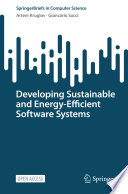

Most ebook files are in PDF format, so you can easily read them using various software such as Foxit Reader or directly on the Google Chrome browser.
Some ebook files are released by publishers in other formats such as .awz, .mobi, .epub, .fb2, etc. You may need to install specific software to read these formats on mobile/PC, such as Calibre.
Please read the tutorial at this link: https://ebookbell.com/faq
We offer FREE conversion to the popular formats you request; however, this may take some time. Therefore, right after payment, please email us, and we will try to provide the service as quickly as possible.
For some exceptional file formats or broken links (if any), please refrain from opening any disputes. Instead, email us first, and we will try to assist within a maximum of 6 hours.
EbookBell Team

4.7
86 reviews1.) to identify existing and easily-collectible measures, if possible in the early phases of software development, for predicting and modeling both the traditional attributes of software systems and attributes specifically related to their efficient use of resources, and to create new metrics for such purposes.
2.) to describe ways to collect these measures during the entire lifecycle of a system, using minimally-invasive monitoring of design-time processes, and consolidate them into conceptual frameworks able to support model building by using a variety of approaches, including statistics, data mining and computational intelligence.
3.) to present models and tools to support design time evolution of systems based on design-time measures and to empirically validate them.
The book provides researchers and advanced professionals with methods for understanding the full implications of alternative choices and their relative attractiveness in terms of enhancing system resilience. It also explores the simultaneous use of multiple models that reflect different system interpretations or stakeholder perspectives.